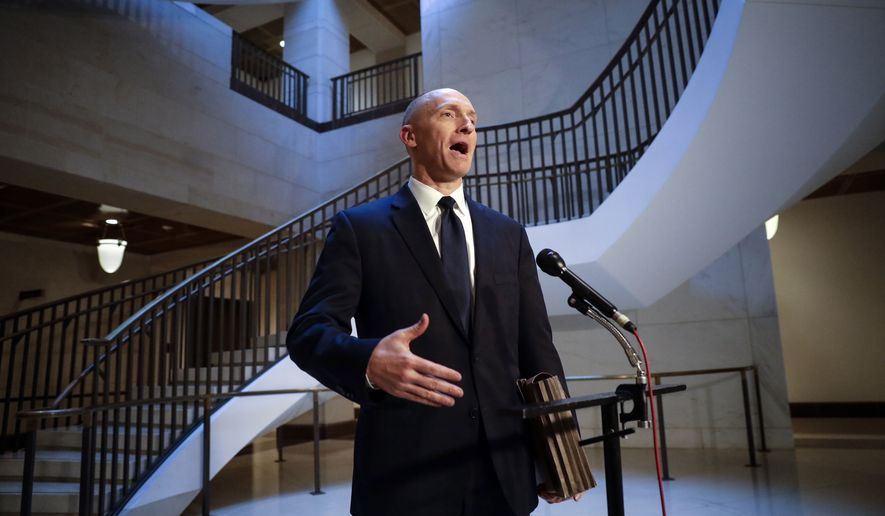Former Trump campaign figure Carter Page has sued the Justice Department, FBI, and a slew of bureau officials for $75 million, saying he was unlawfully surveilled in the Russian-collusion investigation.
The 59-page lawsuit also named as defendants former FBI Director James B. Comey, former Assistant Director Andrew McCabe, ex-bureau lawyer Kevin Clinesmith, and anti-Trump lovebirds Peter Strzok and Lisa Page.
Mr. Page told The Washington Times he may take further steps to address the FBI’s bungling of a 2016 surveillance warrant application to monitor him. But he declined to outline any additional actions.
“More to come,” he told the Times.
Mr. Page says the defendants’ actions constituted a fraud on the Foreign Intelligence Surveillance Court and violated his “constitutional and other rights.”
“Dr. Page is entitled to relief for defendants unjustified and illegal actions (including violations of federal criminal law), which violated federal statutes enacted to prevent unlawful spying on United States persons as well as the Constitution,” says the lawsuit, which was filed late Friday.
An FBI spokesperson declined to comment and the Justice Department did not respond to requests for a comment.
The FBI had wiretapped Mr. Page, a foreign policy adviser for President Trump’s 2016 campaign, for more than a year, starting in October 2016. Bureau officials had suspected he was a recruitment target of Russian intelligence, which was interfering with the election.
No evidence was uncovered linking Mr. Page to Kremlin meddling and he has never been charged with a crime. He was ultimately exonerated by special counsel Robert Mueller, who concluded the Trump campaign did not criminally conspire with the Russian government.
The FBI’s concerns about Mr. Page stemmed from a salacious and unverified dossier prepared by British ex-spy Christopher Steele and funded by Hillary Clinton’s 2016 presidential campaign and the Democratic National Committee. The dossier was ultimately discredited.
Mr. Page says in his lawsuit the FBI knew the Steele dossier was compiled as political opposition research to “dig up dirt on a connection between the Trump campaign and Russia to divert attention from the investigation of Clinton’s email practices while Secretary of State.”
The dossier “falsely alleged unlawful communications and activities involving Dr. Page and two Russians with close ties to Russian President Vladimir Putin,” the lawsuit says.
While trying to obtain the warrants to surveil Mr. Page, the FBI failed to adequately investigate Mr. Steele’s claims, the lawsuit alleges.
A CIA memo declassified last month revealed that ahead of the 2016 election, the intelligence agency asked the FBI to investigate whether Mrs. Clinton plotted to link Mr. Trump to Russia to distract from her email woes.
The FBI withheld exculpatory evidence from the Foreign Intelligence Surveillance Court (FISC) when it sought the warrants to wiretap Mr. Page, according to the lawsuit and a 2019 report from the Justice Department Inspector General.
Among the withheld information was that Mr. Page was a CIA informant between 2008 and 2013, helping the agency combat Russian activities against the United States.
Mr. Clinesmith had doctored an email to falsely state that Mr. Page was not a CIA source, when in fact he was. Earlier this year, Mr. Clinesmith pleaded guilty to falsifying that email.
“To persuade the [FISC] that there were probable cause to believe that Dr. Page was a Russian agent, the defendants provided false or misleading information to the court,” the lawsuit said.
Justice Department Inspector General Michael E. Horowitz found numerous serious errors in the process to obtain the Page wiretap.
Mr. Horowitz uncovered at least 17 mistakes and omissions in the four applications to conduct surveillance against Mr. Page.
Mr. Horowitz said he found no evidence of political bias by the FBI when it opened the Russian collusion probe. But he also said the bureau should have ended the Page investigation months earlier after learning that the accusations against the Trump campaign and its officials were not credible.
Attorney General William Barr last year assigned U.S. Attorney John Durham to investigate misconduct by the federal law enforcement officials in the early stages of the Russia probe.
While the investigation is still ongoing, information uncovered by Mr. Durham may prompt some targets of the Russia probe to pursue lawsuits or other actions.
Numerous officials who signed off on the Page warrant applications have testified before the Senate Judiciary Committee that they would not have approved them based on what they now know.
Appearing before the committee in September, Mr. Comey called the Page warrant application “embarrassing” and “sloppy.”
Last month, Mr. McCabe told the same committee that he also would not have signed the warrant in 2017, but refused to take responsibility for the mistakes.
“I think that we are all responsible for the work that went into that FISA,” Mr. McCabe said.
Earlier this year, Mr. Page filed a lawsuit against Yahoo’s parent company and Huffington Post of publishing “false and defamatory statements” about him and portrayed him as a “traitor to America.” Another lawsuit he filed against the Democratic National Committee was dismissed earlier this year.
• Jeff Mordock can be reached at jmordock@washingtontimes.com.




Please read our comment policy before commenting.